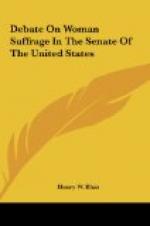This is a concession of the whole argument, unless the highest and final estate of woman is to be something else than a mere individual. It would also follow that if such be her destiny—that is, to be something else than a mere “individual being”—and if for that reason she is to be denied the suffrage, then man equally should be denied the ballot if his highest and final estate is to be something else than a “mere individual.”
Thereupon the minority of the committee, through the “Fair Authoress,” proceed to show that both man and woman are designed for a higher final estate—to wit, that of matrimony. It seems to be conceded that man is just as much fitted for matrimony as woman herself, and thereupon the whole subject is illuminated with certain botanical lore about stamens and pistils, which, however relevant to matrimony, does not seem to me to prove that therefore woman should not vote unless at the same time it proves that man should not vote either. And certainly it can not apply to those women any more than to those men whose highest and final estate never is merged in the family relation at all, and even “Ouida” concedes “that the project ... to give votes only to unmarried women may be dismissed without discussion, as it would be found to be wholly untenable.”
There is no escape from it. The discussion has passed so far that among intelligent people who believe in the republican form—that is, free government—all mature men and women have under the same circumstance and conditions the same rights to defend, the same grievances to redress, and, therefore, the same necessity for the exercise of this great fundamental right, of all human beings in free society. For the right to vote is the great primitive right. It is the right in which all freedom originates and culminates. It is the right from which all others spring, in which they merge, and without which they fall whenever assailed.
This right makes, and is all the difference between government by and with the consent of the governed and government without and against the consent of the governed; and that is the difference between freedom and slavery. If the right to vote be not that difference, what is? No, sir. If either sex as a class can dispense with the right to vote, then take it from the strong, and no longer rob the weak of their defense for the benefit of the strong.




